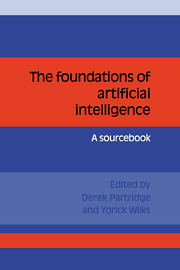Book contents
- Frontmatter
- Contents
- List of contributors
- Preface
- Acknowledgments
- 1 Introduction
- 2 The formal foundations of AI
- 3 Levels of theory
- 4 Programs and theories
- 5 The role of representations
- 6 The role of programs in AI
- What kind of field is AI?
- Programs in the search for intelligent machines: the mistaken foundations of AI
- 7 Rational reconstruction as an AI methodology
- 8 Is AI special in regard to its methodology?
- 9 Does connectionism provide a new paradigm for AI?
- 10 The role of correctness in AI
- 11 Limitations on current AI technology
- 12 Annotated bibliography on the foundations of AI
- Index of names
What kind of field is AI?
Published online by Cambridge University Press: 03 May 2010
- Frontmatter
- Contents
- List of contributors
- Preface
- Acknowledgments
- 1 Introduction
- 2 The formal foundations of AI
- 3 Levels of theory
- 4 Programs and theories
- 5 The role of representations
- 6 The role of programs in AI
- What kind of field is AI?
- Programs in the search for intelligent machines: the mistaken foundations of AI
- 7 Rational reconstruction as an AI methodology
- 8 Is AI special in regard to its methodology?
- 9 Does connectionism provide a new paradigm for AI?
- 10 The role of correctness in AI
- 11 Limitations on current AI technology
- 12 Annotated bibliography on the foundations of AI
- Index of names
Summary
I want to ask ‘What kind of field is artificial intelligence?’ and to give an answer. Why is this an important question? Because there is evidence within AI of a methodological malaise, and part of the reason for this malaise is that there is not a generally agreed answer to the question.
As an illustration, several papers in this volume draw a number of different analogies between artificial intelligence and other fields. AI is compared to physics, to chemical engineering, to thermodynamics and to psychology; in fact it is said to be psychology. Each of these is a very different kind of field with different kinds of methodology, criteria for assessing research and so on. Depending on which of these you think artificial intelligence is really like, you would decide what to do, how to do it, and how to assess other people's work.
Evidence of malaise
One of the symptoms of this malaise is a difference amongst referees of papers as to the standard which is expected for conferences, journals, etc. When I was programme chairman of a major AI conference, I noted that for more than 50 percent of the papers the referees disagreed as to whether the papers should be accepted or rejected. And this wasn't just a question of having different thresholds of acceptability, because the opinions would reverse on other kinds of papers. So clearly the referees were applying very different criteria when deciding which papers were worth accepting.
Information
- Type
- Chapter
- Information
- The Foundations of Artificial IntelligenceA Sourcebook, pp. 215 - 222Publisher: Cambridge University PressPrint publication year: 1990
Accessibility standard: Unknown
Why this information is here
This section outlines the accessibility features of this content - including support for screen readers, full keyboard navigation and high-contrast display options. This may not be relevant for you.Accessibility Information
- 7
- Cited by
